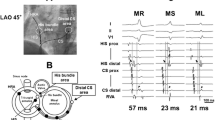Abstract
Ajmaline given intravenously produced complete anterograde block in the accessory pathway of 32 of 59 patients with the Wolff-Parkinson-White syndrome. An electrophysiologic investigation performed 1 day later revealed that failure of ajmaline to produce complete anterograde block in the accessory pathway corresponded to a short refractory period of this pathway (less than 270 ms). The use of ajmaline intravenously is advanced as a reliable and rapid procedure for identifying those patients with the Wolff-Parkinson-White syndrome who have a short refractory period of the accessory pathway and are possibly at risk of circulatory insufficiency or sudden death if atrial fibrillation supervenes.
Access this chapter
Tax calculation will be finalised at checkout
Purchases are for personal use only
Preview
Unable to display preview. Download preview PDF.
Similar content being viewed by others
References
Dreifus LS, Haiat R, Watanabe Y, Arriaga J, Reitman NC: Ventricular fibrillation, a possible mechanism of sudden death in patients with the Wolff-Parkinson-White syndrome. Circulation 43: 520–529, 1971.
Ahlinger S, Granath A, Holmer S: Wolff-Parkinson-White Syndrom med paroxysmalt atrieflimmer overgaende i ventrike-flimmer. Nord Med 70: 1336–1343, 1963.
Castillo-Fenoy A, Goupil A, Offenstad G: Syndrome de Wolff-Parkinson-White et mort subite. Ann Med Interne (Paris) 124: 871–878, 1973.
Martin-Noel P, Denis B, Grunwald D, Buisson M: Deux cas mortels de syndrome de Wolff-Parkinson-White. Arch Mal Coeur 63: 1647–1652, 1970.
Touche M, Jouvet M, Touche S: Fibrillation ventriculaire au coeur d’un syndrome de Wolff-Parkinson-White par choc électrique externe. Arch Mal Coeur 59: 1122–1126, 1966.
Bashore Th M, Sellers TD, Gallagher JJ, Wallace AG: Ventricular fibrillation in the Wolff-Parkinson-White syndrome. Circulation 53:Suppl. II: 187, 1976.
Castellanos A, Myerburg RJ, Craparo K, Befeler B, Agha AS: Factors regulating ventricular rates during atrial flutter and fibrillation in pre-excitation. Br Heart J 35: 811–817, 1973.
Wellens HJJ, Durrer D: Wolff-Parkinson-White syndrome and atrial fibrillation. Relation between refractory period of accessory pathway and ventricular rate during atrial fibrillation. Am J Cardiol 34: 777–782, 1974.
Gallagher JJ, Pritchett ELC, Sealy WC, Kasell J, Wallace AG: The pre-excitation syndromes. Prog Cardiovasc Dis 20: 285–302, 1978.
Wellens HJJ: Value and limitations of programmed electrical stimulation of the heart in the study and treatment of tachycardias. Circulation 57: 845–893, 1978.
Puech P, Latour H, Hertault J, Grolleau R: l’Ajmaline inject-able dans les tachycardies paroxystiques et le syndrome de Wolff-Parkinson-White. Comparison avec la procainamide. Arch Mal Coeur 2: 897–906, 1964.
Wellens HJJ, Durrer D: Effect of procainamide, quinidine and ajmaline on the Wolff-Parkinson-White syndrome. Circulation 50: 114–120, 1974.
Chiale PA, Przybylski J, Halpern MS, Lazarri JO, Elizari MV, Rosenbaum MB: Comparative effects of ajmaline on intermittent bundle branch block and the Wolff-Parkinson-White syndrome. Am J Cardiol 39: 651–657, 1977.
Wellens HJJ, Bär FW, Gorgels AP: Effect of drugs in WPW syndrome. Importance of initial length of effective refractory period of accessory pathway (abstr). Am J Cardiol 41: 372, 1978.
Laham J: Le syndrome de Wolff-Parkinson-White. Maloine, Paris: 75, 1969.
Coumel P, Gourgon R, Slama R, Bouvrain Y: Conduction auriculoventriculaire par des fibres de préexcitation, associée à un bloc complet de la voie nodo-hisienne. Arch Mal Coeur 66: 285–304, 1973.
Author information
Authors and Affiliations
Editor information
Rights and permissions
Copyright information
© 2000 Springer Science+Business Media Dordrecht
About this chapter
Cite this chapter
Wellens, H.J.J., Bär, F.W., Gorgels, A.P., Vanagt, E.J. (2000). Use of ajmaline in patients with the Wolff-Parkinson-White syndrome to disclose short refractory period of the accessory pathway. In: Smeets, J.L.R.M., Doevendans, P.A., Josephson, M.E., Kirchhof, C., Vos, M.A. (eds) Professor Hein J.J. Wellens. Springer, Dordrecht. https://doi.org/10.1007/978-94-011-4110-9_20
Download citation
DOI: https://doi.org/10.1007/978-94-011-4110-9_20
Publisher Name: Springer, Dordrecht
Print ISBN: 978-94-010-5799-8
Online ISBN: 978-94-011-4110-9
eBook Packages: Springer Book Archive




